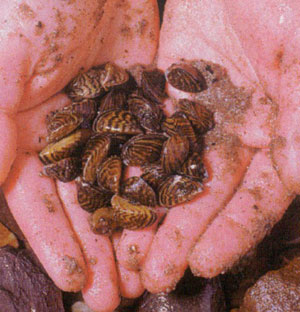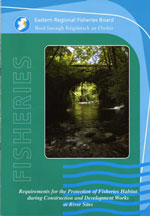Help prevent the spread of zebra mussels
Urgent action is required to prevent the spread of zebra mussels to loughs, rivers and canals in the Eastern Region. The Shannon catchments, Lough Erne and many other Irish waterways are already infested with this pest. Zebra mussels enter new areas when they are attached to objects such as boat hulls and fishing equipment.

What Are Zebra Mussels?
- Zebra mussels are small shellfish that pose a major threat to the lakes and rivers of the western river basin district. The mussel was first identified in the Lower Shannon in 1997. It has since spread through most of the Shannon-Erne waterway mainly by boat traffic.
- Zebra mussels live in freshwater and are native to the lakes, slow-moving rivers and low salinity areas of the Caspian and Black Sea region.
- The zebra mussel shell usually has a striped dark and pale colouration and at the adult stage they are only thumbnail size.
- Adult zebra mussels reproduce within a year when temperatures exceed 12°C, releasing thousands of microscopic young that are carried along by currents. They settle after 3 weeks and soon grow into the shape of a miniature adult. Zebra mussels can live for 3 to 5 years, and rapidly increase their numbers.
What you can do:
If You Own a Boat:
Dry out boats for 4 weeks. Zebra mussels (adults and larvae) will eventually die once removed from water. Ideally, store boats in dry conditions where mussels can dry out.
Scrape down and steam clean your boat following removal from water. High pressure steam cleaning will remove the majority of the mussels and kill the remainder. The temperature needs to exceed 40°C. Steam cleaning facilities are available at most filling stations for a small fee however; it should be ensured that the wastewater from the steam cleaning facility does not drain back into an uninfected waterway.
Clean outboard motors. Flushing removes cooling water that may contain larvae. Attached individuals can be removed manually. Storing outboard engines will drain much of the water, then leave to dry for at least 3 weeks. Heavily fouled motors should be serviced.
If you buy a second hand boat have it cleaned.
Anglers:
Equipment:
- Dry out all equipment or immerse in hot water before use in a different water body.
- Ensure keep nets or landing nets do not have zebra mussels attached.
Bait:
- Do not dump live bait taken from infested waterways into a zebra mussel free area
- Do not re-use bait if it has been exposed to infested waters.
- Do not use zebra mussels as bait in uninfected waters.
Water:
- Do not transfer water from an infected lake to a zebra mussel free lake.
Problems associated with zebra mussels
Irreversible Changes to Ecology
Zebra mussels can filter as much as 1 litre of water per day through their gills. They remove phytoplankton, small zooplankton and bacteria amongst other things. As a result of this activity, the food web of their new habitat is changed. Studies have shown that this leads to reductions in different populations of fish. Zebra mussels attach onto the shells of swan mussels (Anodonta sp.), preventing them from feeding, resulting in death of the swan mussels.
Biofouling Costs Money
Zebra mussels can have a serious economic effect at facilities that depend on water intake by blocking pipes. They will attach to any hard surface in the waters in which they occur, quickly spreading and covering the surface. Preferred surfaces include stone, wood, concrete, iron/steel, aluminium, plastics and fiberglass. As a result, boats and water treatment plants can be damaged.
